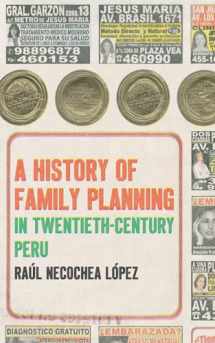
A History of Family Planning in Twentieth-Century Peru
Book details
Summary
Description
Adding to the burgeoning study of medicine and science in Latin America, this important book offers a comprehensive historical perspective on the highly contentious issues of sexual and reproductive health in an important Andean nation. Raul Necochea Lopez approaches family planning as a historical phenomenon layered with medical, social, economic, and moral implications. At stake in this complex mix were new notions of individual autonomy, the future of gender relations, and national prosperity.
The implementation of Peru's first family planning programs led to a rapid professionalization of fertility control. Complicating the evolution of associated medical services were the conflicting agendas of ordinary citizens, power brokers from governmental and military sectors, clergy, and international health groups. While family planning promised a greater degree of control over individuals' intimate lives, as well as opportunities for economic improvement through the effective management of birth rates, the success of attempts to regulate fertility was far from assured. Today, Necochea Lopez observes, although the quality of family planning resources in Peru has improved, services remain far from equitably available.


We would LOVE it if you could help us and other readers by reviewing the book
Book review



